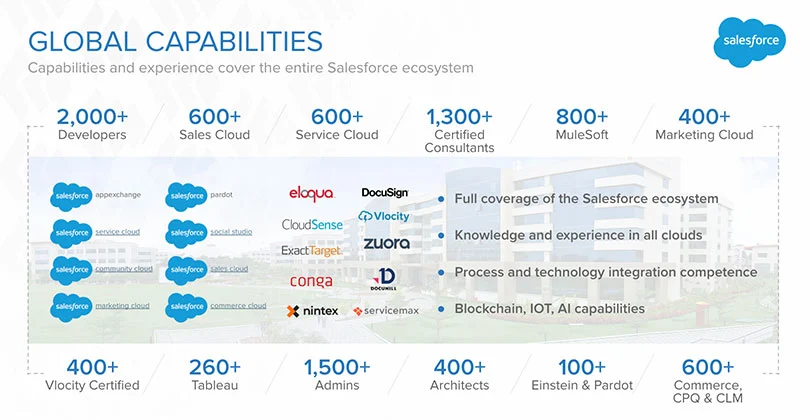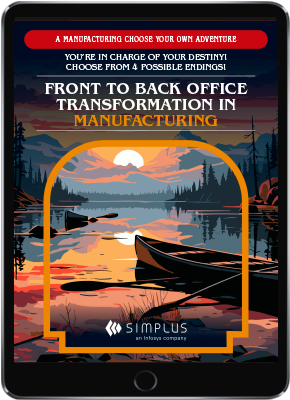“Being able to understand what is happening on the ground is imperative for success,” says Cindy Bolt, SVP and GM of Salesforce Manufacturing. However, many manufacturers aren’t equipped with the best tools and technology to be that in tune with operations. Between massive amounts of unorganized data, siloed systems from the M&A landscape, and paper-based processes slowing everyone down, the manufacturing space has its share of particular industry challenges. In fact, less than half of manufacturing executives say that their agents can access customer information if not on the internet or WiFi, a critical need for field reps who can’t always get online easily.
In short, problems with CRM in manufacturing need manufacturing solutions—the industry dynamics are just that particular. However, not every CRM will provide your organization with industry-specific solutions, and even if they do, it’s not without a lot of extra add-ons and customizations gobbling up more of your time, money, and resources. Luckily, some CRM leaders, like Salesforce, do provide an out-of-the-box, industry-tailored design for manufacturing. Introducing Salesforce Manufacturing Cloud.
Jenny Gai, Salesforce’s Global Lead of Manufacturing Cloud Operations, and Tom Lovell, Simplus’ Manufacturing Industry Lead, got together during OwnBackup’s resilience.work event earlier this year to field commonly asked questions about Manufacturing Cloud, a solution that can accommodate the various scenarios unique to manufacturers within an out-of-the-box Salesforce offering. Together, these industry experts covered the basics of Manufacturing Cloud, where to expect the most value out of it, what types of manufacturers should consider the offering, and what best practices to implement when you get started.
Let’s take a look at some of the highlights from this insightful Q&A session!
Why Manufacturing Cloud
Manufacturing Cloud is the byproduct of Salesforce’s years of expertise in the CRM market. Two decades ago, the Salesforce platform was very horizontal and without much industry-specific offerings. Since then, Salesforce has watched how specific industries customize and build out Salesforce for their particular needs. Manufacturing Cloud is a solution embodying the most common manufacturing-specific customizations for sales and servicing through Salesforce.
With Manufacturing Cloud, manufacturers can get the full 360-degree view of their customers with an out-of-the-box implementation of Salesforce tailored to their industry needs. Combining features of Sales Cloud, MuleSoft, Community Cloud, and Service Cloud with manufacturing particular go-to-market strategies is the name of the game with Manufacturing Cloud, making the time to value for your Salesforce investment even faster.
Where to expect the most value out of Manufacturing Cloud
Speaking of value, there are different ways to leverage the Manufacturing Cloud and receive various value-adding results. Depending on your organizational objectives, you can customize and personalize Manufacturing Cloud to meet those expectations. Take a look at some of the most popular value-add areas motivating manufacturers to adopt Manufacturing Cloud:
– Profitable growth: If you’re leaking revenue or can’t correctly attribute and account for revenue generation sources, this will reflect in your profit margins. Manufacturers that take advantage of Manufacturing Cloud have better visibility into sample management, partner relationships and deals, and sales forecasting, all leading to better numbers down the line for the company’s overall growth.
– Operational efficiency: If there are outdated documents and manual processes with a high rate of handoffs, those are prime suspects of inefficiencies that are draining your operational resources. Countless hours of time and effort can be saved through a digital transformation with Manufacturing Cloud at the lead.
– Customer experience: With its unique design, backed up by years of firsthand manufacturing users in Salesforce, Manufacturing Cloud has the perfect functionality built-in to transform how your partners, distributors, contractors, and clients interact with you. It’s user-friendly, intuitive, and sleekly designed, meaning it’s a platform meant to keep customers coming back to you as their go-to manufacturer for the products and solutions they depend on.
What types of manufacturers should leverage Manufacturing Cloud
Manufacturing Cloud is tailored to organizations across the industry, including discrete, process, automotive, and more. Companies that rely on run rate business and lengthy contracts with their customers—meaning most manufacturers of chemicals, widgets, parts, and pieces—will find immense value in a Manufacturing Cloud implementation.
Additionally, Manufacturing Cloud is perfect for companies that are regularly distributing products and parts to a lengthy supply chain of distributors and partners. Manufacturing is known for having a wide web of interconnected suppliers and distributors, and it’s characteristics like that that make the Manufacturing Cloud ideal for any manufacturer looking to amplify and elevate its unique market positioning and its critical role in the sales cycle.
Best practices for success
Finally, in addition to the right industry tools and technology offered by Salesforce, you’ll need to pair that with the best internal practices to get the most out of a Manufacturing Cloud implementation. Tom and Jenny again offered some extremely helpful tips from their firsthand experience witnessing organizations adopt this technology:
1. Get everyone aligned on the same goals: First and foremost, make sure your executive alignment is in place. What are the goals for this digital transformation, and what results are you hoping to achieve through a Manufacturing Cloud implementation? Whether it’s increased visibility, faster operations, or sleeker UX, make sure you clearly define a handful of KPIs to measure the success of your implementation against.
2. Inform your team in advance of the new technology: Make it clear to your affected team members what the expectations are for utilizing Manufacturing Cloud by drawing a connection between the organization’s stated objectives and the technology: how does this Manufacturing Cloud tool help us attain x, y, and z goals? If you can’t clearly answer that and don’t inform your team, Manufacturing Cloud’s ROI will fall on deaf ears.
3. Migrate your historical data: Before going live, you must take the time to get all existing data integrated into the new Manufacturing Cloud setup. This way, from day one of official use, you can display accurate forecasting and start realizing ease of use immediately.
4. Understand avenues for growth and utilize a phased approach: Manufacturing Cloud isn’t just a static, one-and-done tool. It’s built to grow with your organization. Make sure you connect with Salesforce and a proven implementation partner to consult on the various ways you can incrementally adopt the features of Manufacturing Cloud that are most important to your organization at the forefront. These experts can also help you plan for how you can iterate over time as more budget, understanding, and visibility into business operations open up.
Industry-specific needs demand an industry-specific solution. Manufacturing Cloud is the answer, providing a complete, holistic look for manufacturers’ sales forecasting and partner experiences.
Learn more about what Manufacturing Cloud is and how it can transform your organization by watching the complete session, including a demo of the implementation, here.






















































0 Comments